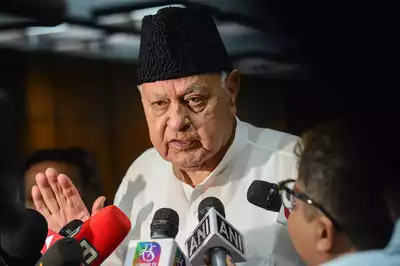


What has come upon Farooq Abdullah? For that matter, what has come upon the politicians from the DMK? Why do they think that making irresponsible statements is the right way to establish their political relevance? Some DMK politicians have cultivated the habit of putting both their feet in the mouth whenever they open it. First it was the attack on Sanatan Dharma by none other than M.K. Stalin’s son, DMK heir and Tamil Nadu minister, Udhayanidhi Stalin, who equated the religion followed by Hindus with malaria and dengue.
Then it was DMK MP, M. Mohamed Abdulla who was seen arguing in Parliament recently that the abrogation of Article 370 was an attack on federalism—and this in spite of the Supreme Court upholding the abrogation. And now a video—supposedly from 2019—has surfaced of senior DMK politician and ex Union minister Dayanidhi Maran, trying to prove Tamil superiority by saying that the people from Bihar and Uttar Pradesh come to Tamil Nadu to clean toilets. Even before the controversy over Maran’s statement ended, Farooq Abdullah, as if missing all the limelight, jumped into the ring to predict a Gaza like situation in Jammu and Kashmir if India does not normalise relations with Pakistan. It is a different matter that Abdullah has been predicting doom and gloom for India for ever with regard to Article 370—in vain. Even then, shouldn’t he be more responsible in his utterances?
Gaza is witnessing a war—a military onslaught. It is being bombed by Israeli jets. Civilian death toll is mounting. Gaza strip has turned into rubble. It’s a full-blown humanitarian crisis, which the Hamas terrorists brought upon Gaza by launching the most heinous attack on Israel on 7 October. What’s happening in the Israel-Hamas war is a fate that should not befall any land. For a Kashmiri politician, who has been Chief Minister and is even now a representative of J&K in Indian Parliament, to predict a future where his own land turns into Gaza is problematic. Unless of course scare-mongering is his intention. Looking back, such was the fear created by politicians like Abdullah that Kashmir would burn if anyone even thought of abrogating Article 370, that successive governments did not dare to touch the Article even though it was a temporary provision in the Constitution. When Article 370 was abrogated on 5 August 2019, Kashmir did not burn. In the last four and a half years, mass unrest in Kashmir and oppression by the Indian authorities have existed only in the imagination of foreign op-ed writers and the disinformation system that feeds them. Moreover, India does not bomb its own people, however much the provocation or the cost in terms of human lives—historically, neither in Jammu and Kashmir, nor in the insurgency prone areas of middle India and the Northeast.
So what is Abdullah hinting at, that the Pakistan military establishment will increase its terrorist activities in J&K unless and until India starts speaking to Pakistan? India is clear that terror and talks cannot go hand in hand. Whenever India has extended its hand of friendship towards Pakistan, the latter has backstabbed it, either through war—Kargil—or by escalating terrorist activities. Talks are no guarantee that terrorism will stop. Also, India is in a different league, where peace with Pakistan is desirable, but not imperative. India’s economic prosperity does not depend on its relations with a bankrupt and broken country like Pakistan; it’s rather the other way round. The days of hyphenating India and Pakistan are long gone. Only the delusional in Pakistan believe in their importance in India’s scheme of things. No wonder Farooq Abdullah seems to be caught in a time warp when he starts advocating an India-Pakistan dialogue.
After decades of unrest and turmoil, the people of J&K are finally coming to the mainstream, and thus experiencing the constitutional rights enjoyed by Indian citizens, as well as the perks of development that come with it. Shouldn’t normalisation be given a chance for the good of the people? Shouldn’t Farooq Abdullah be strengthening that process, instead of coming across as unhappy with what is happening in the valley? Surely, personal good can take a back seat in the face of greater public good.
As for the DMK leaders, why do they feel the need to insult? Why will political leaders occupying responsible positions feel the need to use divisive rhetoric and stoke regional chauvinism? Their statements are making the political discourse in the country hit the nadir, apart from having the potential to cause strife and discord at the ground level. Are these statements a sign of their political insecurity? If governance is poor, if people are unhappy, regional “pride” will not save a political party from decimation during elections.
Hence, the shriller the DMK leaders get in highlighting the so-called North-South divide or the Dravidian identity, questions will rise if they are losing their grip on their turf.
The bottom line is, speech—any speech—has to be carved with care. By bringing their insecurities to the fore, these politicians are lowering the dignity of the country’s political space.
Joyeeta Basu